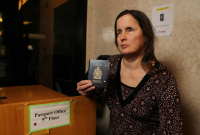Support strong Canadian climate journalism for 2025
The federal government says it's reviewing a policy that forbids staff in Canada's passport offices from helping disabled applicants fill out their forms.
Immigration, Refugees and Citizenship Canada says it's looking into revising the policy, which bars staff from filling out applications on someone else's behalf for fear of potential forgery cases.
The policy applies nationwide, and IRCC currently says Canadians requiring help with their documents should have a friend or family member complete the paperwork.
In the past five weeks, two Canadians with disabilities filed formal complaints against the policy after being denied help at Service Canada offices in Ontario. Both say the current approach is inadequate and presents a troubling accessibility barrier for people wishing to be able to complete passport documents with independence and confidence.
IRCC did not offer any indications as to when potential revisions might take effect.
News of the government's softened position was greeted with cautious optimism by some of those most impacted by the current policy.
Andrew Gurza, who has cerebral palsy and can make limited use of his hands, ran up against the Passport Canada stance last month when he tried to renew his passport at an office in Toronto. Gurza said he made the trip to the passport office on his own using local paratransit and did not have an attendant or support worker present with him at the time.
Unaware of the policy, he asked for assistance filling out the forms believing office staff would be best equipped to ensure his forms were completed accurately and legibly. Instead, he was told that policy prevented anyone from completing the paperwork on his behalf.
Gurza said he had to return home, seek help completing the form, then wheel back out to the post office to deliver the application. Now he hopes the government's effort to revise the policy will involve seeking input from people who live with its effects.
"Just to make it accessible for someone who can't write, or someone who is blind or visually impaired, that only covers a tiny fraction of people with disabilities," he said. "They really need to engage in public consultations quite quickly with a varying number of people living with various disabilities to enact a policy that is accessible to everyone."
Weeks earlier, Rebecca Blaevoet of Windsor, Ont., had a similar experience at her local office when she went to renew her travel documents. Blaevoet, who is totally blind, sought help, but a clerk informed her that he could not fulfill her request, adding doing so was "not his job.''
Blaevoet escalated the matter to a supervisor, who said Passport Canada staff could not complete the form for fear of "leading the applicant" to provide inaccurate answers. When Blaevoet offered to sign a document authorizing staff to assist her, she said no such accommodation could be granted.
Blaevoet was offered a braille form, which would have allowed her to read the application but would not provide a means of filling in answers. Staff then discovered they had no braille forms in stock.
Blaevoet was ultimately told she could handwrite the form, an option she said she accepted to illustrate what she called the absurdity of the policy. She also noted that such an option would not be available to visually impaired people who lacked handwriting skills, as well as those with physical disabilities limiting their movements.
The government has stated that the current policy exists for the protection of applicants.
"Currently Passport Canada and Service Canada officers are not authorized to write information or fill out a form on behalf of an applicant, as every passport application form has the potential of being required as documentary evidence in the prosecution of a charge of forgery and because it could represent a potential conflict of interest on the part of the employee," IRCC said in a statement.
Blaevoet acknowledges those concerns have merit, but said a revised policy must be more flexible to account for the varying needs of Canadians with disabilities.
"You can't have a policy that's that black and white without having any gradients of consideration for people who couldn't fulfil it," she said.
Both Blaevoet and Gurza have filed official complaints and say they have heard from Passport Canada officials who listened to their concerns attentively.
IRCC did not give any indications as to what the policy revision process looks like, what alternatives they're considering or whether public consultations would be part of the process.




Comments